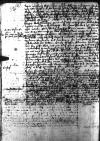List #3435
Ioannes DANTISCUS do Nikolaus FRIEDWALDHeilsberg (Lidzbark Warmiński), 1548-08-24
Rękopiśmienne podstawy źródłowe:
Pomocnicze podstawy źródłowe:
| ||||||
Tekst + aparat krytyczny + komentarzZwykły tekstTekst + komentarzTekst + aparat krytyczny
Unsernn freuntlichenn grus und alles guts zuvorann. Ersamer mannhafter her posunder gutter freundt.
Wir habenn gerne auf konin[g]liche commissio /
Ewer Erbarkeit bitte noch Ewrem
Datum aus unserm schloss
